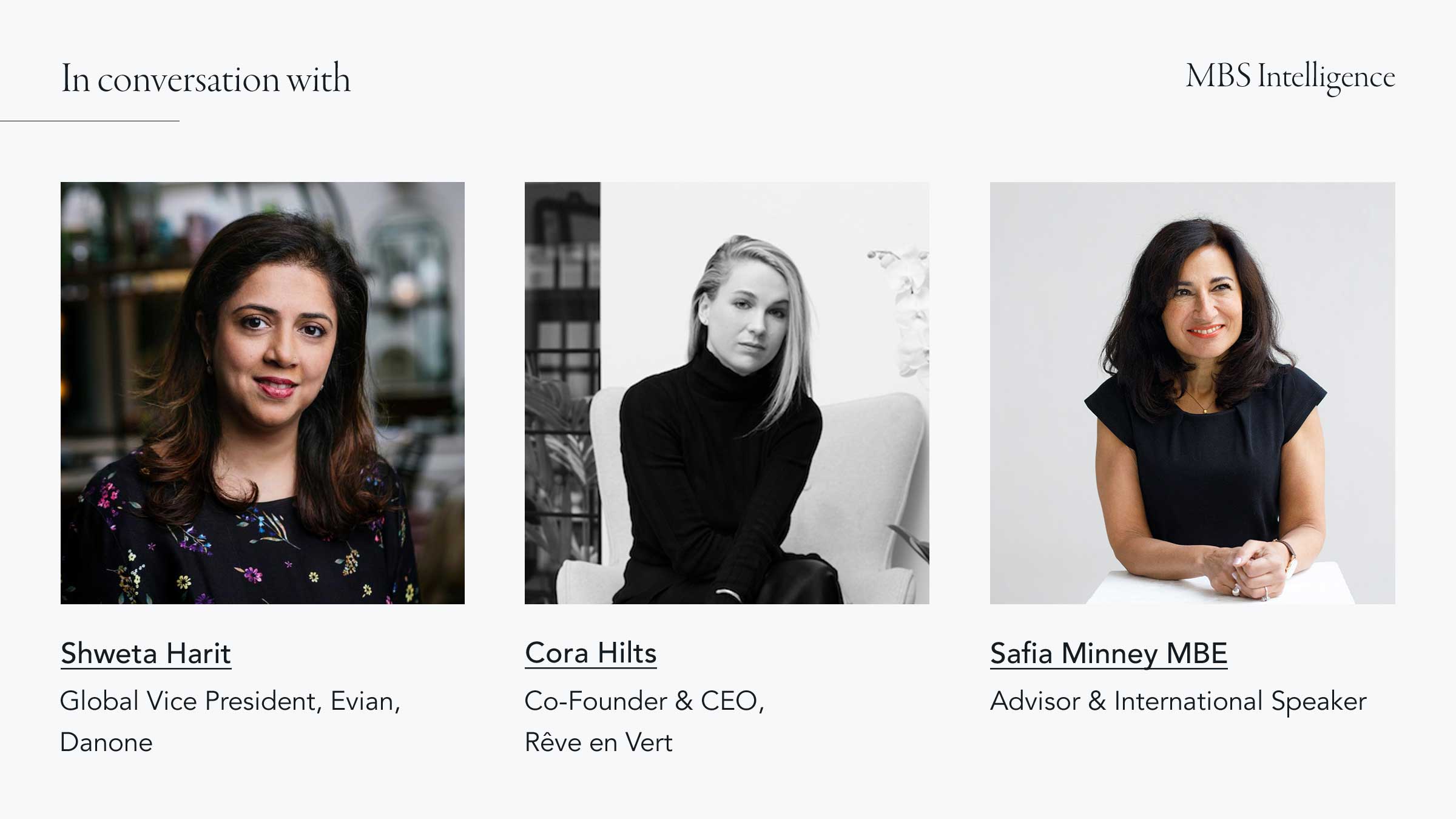Two weeks ago, The MBS Group hosted a behind-closed-doors conversation with three of the brightest minds in corporate sustainability and ethical fashion. Looking to deep-dive into what consumers care about, and a brand’s responsibilities to its community and environment, we brought together Cora Hilts, CEO and Founder of the sustainable online retailer Rêve En Vert; Safia Minney, founder of fair trade apparel company People Tree and advisor and international speaker on corporate sustainability; and Shweta Harit, Global Vice President of Evian at Danone.
Conversations around sustainability, diversity and responsible capitalism have been gaining significant traction over the last decade – but it is as yet unclear whether Covid-19 has fast-tracked this trend or reversed progress. “I think there’s been a real shift to consume more thoughtfully,” Safia began. “Customers are thinking about what really matters, and buying less as a result.” Drawing on issues that sadly still exist in some areas of the fashion industry such as illegal underpaying and systematic racism, Safia suggested that “there is a deep dissatisfaction with the status quo – and it’s really brought certain questions to the fore, about how to tackle modern slavery in supply chains – whether in Leicester or Dhaka – and how to transition to net zero carbon by 2030”.
Cora affirmed Safia’s view: “it seems as though we’re coming to the end of a long road and finally shouting about the issues that matter. We’ve known about environmental and humanitarian issues in fashion (and beyond) for decades, and not nearly enough has been done about them.”
Offering a corporate perspective, Shweta confirmed that these sorts of discussions are top of the agenda at Danone. “Sustainability is front and centre for Evian. So, it’s not a separate team; it’s not a pledge; it’s not run by only the operations department. It’s right at the heart of what we do every day.
Clearly, there is no quick fix for many of the issues that exist in the consumer-facing sector. One positive step, agreed the panellists, would be to see higher levels of government and state regulation. “Our governments have to step up,” suggested Cora, “I mean, it is absolutely shocking to me that the climate emergency is not at the top of every parliamentary discussion.”
Safia agreed, noting that “we need better government legislation on modern slavery, and further regulation and enforcement of claims around the different certifications that exist to indicate organic, fair trade, vegan, ethical or recycled products. There’s so much out there and we can’t expect customers to do all the work!”.
While overarching state regulation might provide a clearer underpinning for consumers and businesses alike, all panellists identified the need for investors to prioritise ESG to make real progress. “Finance is where it’s at to hold companies accountable,” Safia offered, “those are the levers we need to pull to improve practice and put nature and people alongside profit. Shareholder action led by concerned citizens and campaign groups is also becoming an incredible force for change.”
Cora concurred: “we need people at the top – governments, executives, investors – to put sustainability and humanitarian issues at the top of their agenda. As a small retailer, we’re not going to be the ones to make systematic changes.”
One such business is Danone, which is benefiting from strong leadership guided by a vision of sustainability and fairness. “It’s vital to have a CEO who drives the vision,” Shweta said, “and that’s what we’ve got at Danone.” Emmanuel Faber, chief executive of Danone, has recognised the importance of prioritising his people, communities and the environment – and Danone now operates with the aim of becoming the first multinational B-Corp.
“At Evian,” Shweta explained, “we are combining our commercial story with our sustainability story. The two go hand in hand, as we plough so much of our profits back into the environment and our source. It makes such a difference when the leadership is so focused on it.”
Indeed, while genuine endorsement from the CEO down is a vital part of inspiring long-term transformation, it is undeniable that the majority of shareholders and decision-makers do currently benefit from the present system and are therefore the least likely to champion these issues. The panellists agree that the corporate world requires an overhaul of values, and a rethinking of existing business models where the only beneficiaries are the shareholders.
“It’s very difficult to make change, encourage transparency and drive genuine sustainability, social justice and the debate on systemic racism when corporate leadership is largely white middle-class men, who lack the diversity of perspective and life experience,” suggested Safia. “It can be very frustrating for people in a business, if the CEO and board don’t have the courage to address the issues, learn and innovate. This convergence of crises – climate, ecological and social – requires leaders with courage and humility who are prepared to take risks. I see a new set of leaders emerging who have the appetite for this”.
Shweta agreed with Safia, recalling a recent business conversation: “some people have been in the corporate sphere for 30 or 40 years, and cannot imagine a world where money-making isn’t the primary goal. It’s been interesting having healthy debates with those that find it difficult to consider other options of what success looks like.”
This point led us at MBS to consider how we judge the merits and success of a CEO or board. Traditionally, the benchmarks have been financially skewed – increased revenue, share price and improved EBITDA – but increasingly we see that the transformative challenge of improved diversity, inclusion, mentorship and embedding sustainable values into the core business purpose has become a true marker of modernity and achievement. Looking ahead, the consumer-facing sector should embrace holding its leaders to account and move beyond commercial performance as the only indicator of success.

To wrap up, I asked Cora what she’d say to executives trying to prioritise sustainability. “Something I say to every person in business is: why are you working? Are you working to put food on the table? To look after your children? To buy that beach house? We have all been taught to put emphasis on these things – but there is a real climate emergency happening right now. Are you going to enjoy that house if the beach below has eroded? Is it going to matter to your children that they had a five-star upbringing if they don’t have fresh, clean air, water, any of these things? When you ask yourself that every day it is a really powerful tool to actually change your mindset and do something different.”
I left our conversation feeling that Covid-19 has waved in a new era of vision-led leadership, sustainability and conscious consumption. In today’s world, businesses are judged on a broad set of criteria that encompass not only financial gain but also an organisation’s impact on its planet and its people. Executives are expected to be visionary leaders: forces for good as well as encouraging bottom-line growth and driving share price. In fact, research clearly shows companies with sustainability as a core corporate principle are able to attract a higher calibre of executives, deliver better share price growth and out-perform those who don’t. And that’s just good business in anyone’s book.









